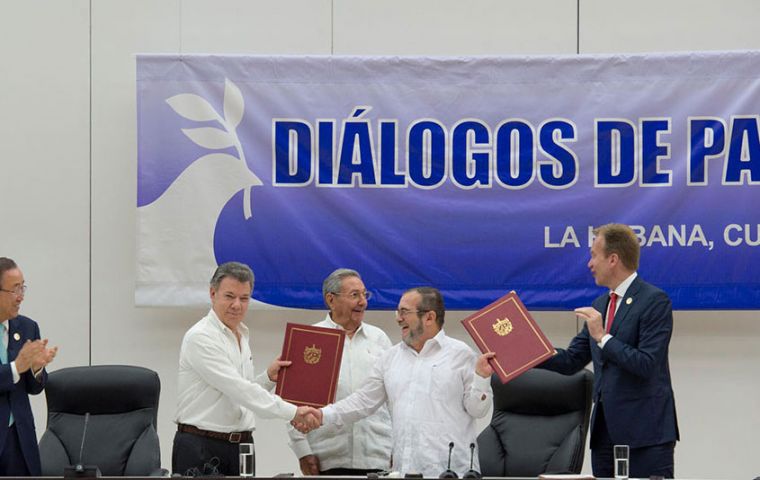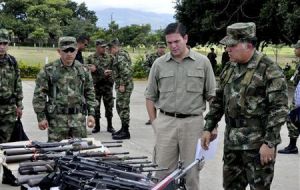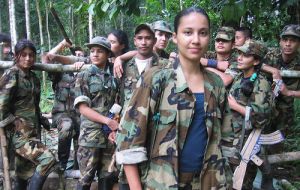MercoPress. South Atlantic News Agency
Colombia signs historic cease fire to end half a century armed conflict
 Castro handed the document to Colombian President Juan Manuel Santos and FARC chief Rodrigo Londoño, who shook hands amid applause.
Castro handed the document to Colombian President Juan Manuel Santos and FARC chief Rodrigo Londoño, who shook hands amid applause.  The bilateral cease-fire requires FARC to lay down all of their weapons within 180 days of the conclusion of a final peace accord
The bilateral cease-fire requires FARC to lay down all of their weapons within 180 days of the conclusion of a final peace accord  The rebels' demobilization, which is supposed to take place in three phases, will be monitored by an U.N.-supervised international team.
The rebels' demobilization, which is supposed to take place in three phases, will be monitored by an U.N.-supervised international team. An agreement aimed at ending more than five decades of conflict between the Colombian government and the FARC guerrilla group was signed in Havana on Thursday at a ceremony presided over by Cuban head of state Raul Castro.
After the members of the respective delegations added their signatures, Castro handed the document to Colombian President Juan Manuel Santos and FARC chief Rodrigo Londoño, who shook hands amid applause.
The bilateral cease-fire requires the Revolutionary Armed Forces of Colombia, or FARC, to lay down all of their weapons within 180 days of the conclusion of a final peace accord, according to a joint statement read to reporters in Havana, where Bogota and the rebels have been negotiating since November 2012.
The rebels' demobilization, which is supposed to take place in three phases, will be monitored by an U.N.-supervised international team.
The “totality of the FARC armament” will be handed over to the United Nations for the construction of three monuments agreed upon by the government and the rebels, the statement said.
Also mandated is the establishment of eight camps and 22 “temporary normalization zones” to facilitate the disarming of the rebels and their preparation for returning to civilian life.
The final peace pact will be signed in Colombia, Santos said Thursday in Havana, where he and Londoño - better known by the nom de guerre Timochenko - were joined by Castro and the presidents of Venezuela, Nicolas Maduro; Chile, Michelle Bachelet; the Dominican Republic, Danilo Medina; El Salvador, Salvador Sanchez Ceren; and Mexico, Enrique Peña Nieto.
U.N. Secretary-General Ban Ki-moon was also present, along with prime minister of Norway.
“Not only did we agree on end to the confrontations, but we also defined a precise schedule for the FARC to lay down their arms forever. This means no more and no less than the end of the FARC as an armed group,” Santos said.
“We were adversaries, from now on we will have to be allies for the good of Colombia,” Timochenko said.
Prior to concluding the cease-fire, the government and the FARC reached agreements on land reform, political participation, drugs and drug crop, and redress for the victims of the strife.
The Colombian government maintains that the final peace accord should be put to a vote in a referendum.
However the president of Colombia's Catholic bishops' conference welcomed the bilateral cease fire, the anticipation of a peace accord that could end decades of guerrilla warfare, but cautioned that some questions remain.
“The people want to immediately see the effects of the agreement,” said Archbishop Luis Castro Quiroga of Tunja, who has been present at peace talks between the government and the Revolutionary Armed Forces of Colombia (FARC). “We need a clear sign that the signature of the agreement is not just a symbolic act.”
Archbishop Castro said that key questions include whether the FARC rebels will surrender their weapons, and whether both sides will respect a cease-fire agreement. Further in the future, questions will arise about amnesty for rebel leaders, accountability for human-rights violations, and the involvement of rebels in drug trafficking.
FARC has been fighting against the Colombian government for 50 years.




Top Comments
Disclaimer & comment rulesCommenting for this story is now closed.
If you have a Facebook account, become a fan and comment on our Facebook Page!